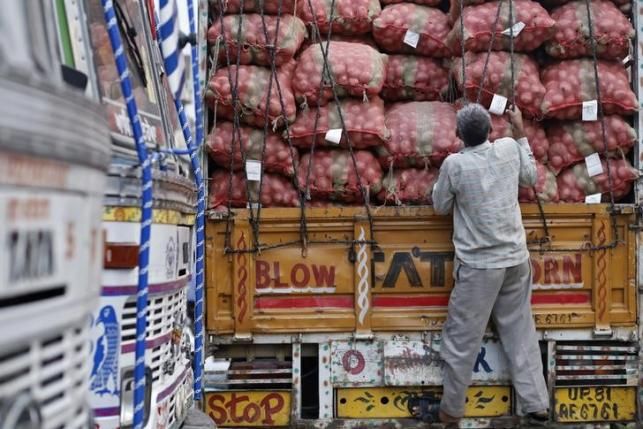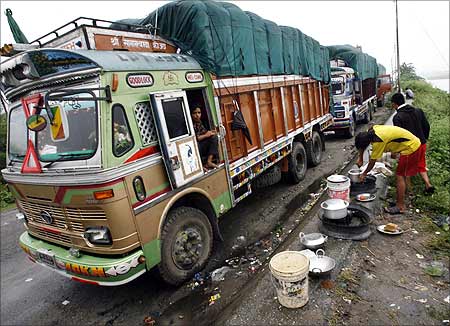 There are some hopes that the winter session of Parliament will be productive as the Bharatiya Janata Party reaches out to the Opposition.
There are some hopes that the winter session of Parliament will be productive as the Bharatiya Janata Party reaches out to the Opposition.
If the Bharatiya Janata Party and the Opposition are able to reach a consensus and pass the Goods and Services Tax Bill in the winter session of Parliament, it would boost market sentiment. Points of contention about the Bill are, however, quite a few and hard to ignore
There are some hopes that the winter session of Parliament will be productive as the Bharatiya Janata Party reaches out to the Opposition.
The Nifty and the Sensex have gained through the past few sessions as optimists are betting there will be some progress in terms of passing the long-awaited Goods and Services Tax Bill.
However, it remains to be seen if the BJP’s efforts to be more conciliatory will fructify into meaningful legislation.
As it stands, there are also points of contention about the nitty-gritty of the GST as proposed, what with some key items being exempted and a proposed tax rate that seems too high for comfort.
Overseas, there are a lot of hopes riding on the European Central Bank’s scheduled meeting on Thursday, December 3, and a lot of fears centred on the US Federal Reserve’s meeting on December 16.
Pertinent data about US employment in November are due this week and the jobs data are likely to shape the Fed’s decision to hike rates, or hold.
Some form of easing is expected from the ECB.
The euro has tumbled against the US dollar, as global currency markets discount this likely policy divergence.
The Reserve Bank of India is likely to adopt a wait and watch policy in its meeting on Tuesday, December 1, as it waits for the ECB and the Fed to make up their minds.
The rupee has softened versus the dollar and volatility is guaranteed until the Fed decision at the least.
The RBI is expected to stick to its commitment to review inflation in January 2016 before it makes any decisions about money supply or policy rates.
In the meantime, fears of a regulatory crackdown on brokerages led to panic selling in China and this could be infectious if it continues.
Tensions in West Asia have mounted further, with Russia and Turkey in a stand-off following the shooting down of a Russian military jet.
This could have an impact on energy pricing if it flares up.
The UN Climate Change Conference in Paris could also have some impact on energy pricing as well as the capital goods industry. In broad terms, green industries could gain while fossil fuel-based industries might lose.
But the details of nation by nation commitments to cutting emissions will matter.
The macroeconomic picture remains so-so for India.
It’s difficult to understand if gross domestic product growth has actually improved.
The RBI governor estimates that factories are operating at 30 per cent below capacity and thinks that domestic investment will remain weak. Exports continue to fall; so do imports.
At the wholesale level, it seems automobile sales have increased but there is also anecdotal evidence that dealers are holding high levels of inventory. So, demand might not have improved that much.
On the other hand, so long as crude, coal and gas prices stay low, the current account would not be a cause for concern.
Thus far, the gold monetisation scheme does not seem to have found many takers, which is a pity.
The banking sector is likely to come under increasing scrutiny, given the magnitude of non-performing assets and restructured assets and the very low credit off-take.
Foreign portfolio investors have been net sellers of Indian equity over the past three months.
In November, they sold substantial quantities of debt as well.
They have been net sellers of Indian assets through this fiscal with Rs 15,391 crore (Rs 153.91 billion) of equity sales exceeding net debt purchases of Rs 9,387 crore (Rs 93.78 billion).
It is possible that the FPIs are anticipating further pressure on the rupee.
They tend, in any case to keep a low profile during December.
On the corporate front, the success of the IndiGo initial public offering could help energise the primary market.
IndiGo has gained over 30 per cent since listing. Punters are now watching developments with interest in the widely anticipated IPO of L&T Infotech. L&T has deferred the sale of L&T Valves to focus on the IPO.
Meanwhile, the US Food and Drugs Administration’s warning letter to Dr Reddy’s Laboratories has had some negative impact.
This is the latest in a series of sharp communications from the FDA to Indian pharma companies.
The latest findings of lead in Nestle’s Maggi Pazzta will also have a negative impact, for sure.
The next two weeks could redefine sentiment in global markets. Central bank action will continue to be a major driver.
If the GST is passed, it will provide a big boost to local sentiment even if the Bill appears flawed for reasons mentioned before in this article.
Most likely however, the GST will not be passed -- the animosity between the BJP and the Opposition goes too deep at the moment.
If it is not passed, sentiment will dip again.
Technically speaking, the current rally would have to break past 8,300 where the 200 Day Moving Average to signal that the bearishness we have seen since March is coming to an end.
That would require an up-move of about five-six per cent up.
It’s not impossible but it is hard to see this happening in the absence of strongly positive FPI sentiment. If FPI sentiment stays bearish or cautious, the market could dip again.
The interim support on a fall would be around 7,700-7,750.
Image: A labourer loads vegetables to a truck. Photograph: Reuters












 © 2025
© 2025